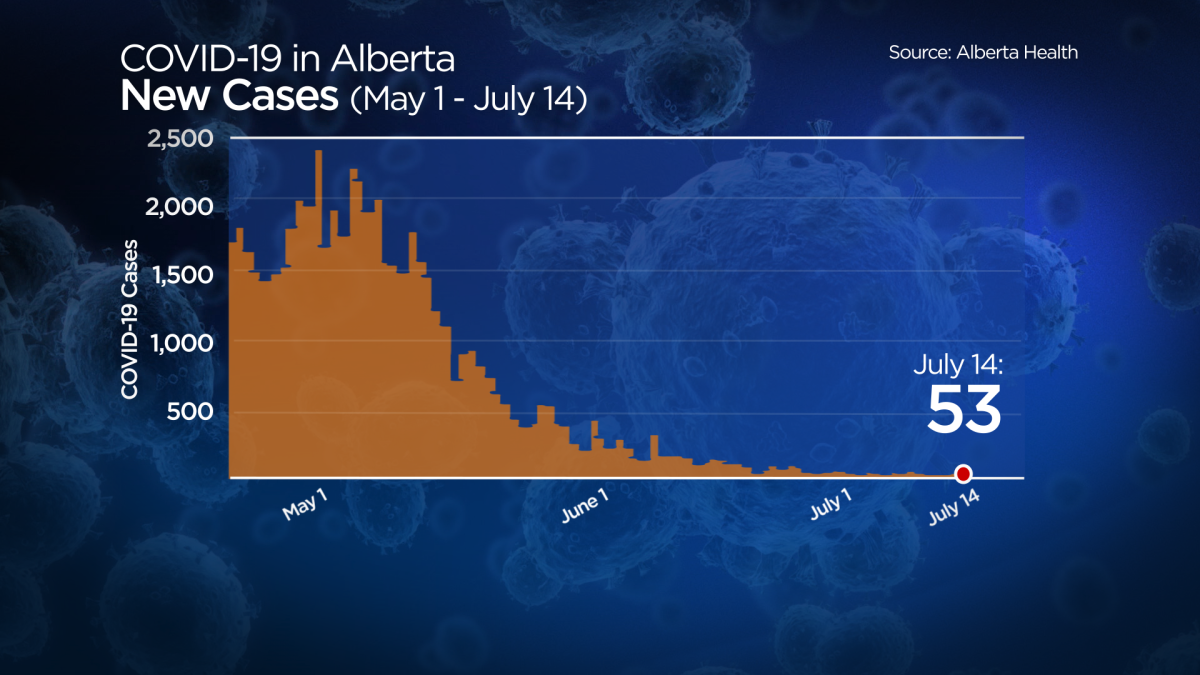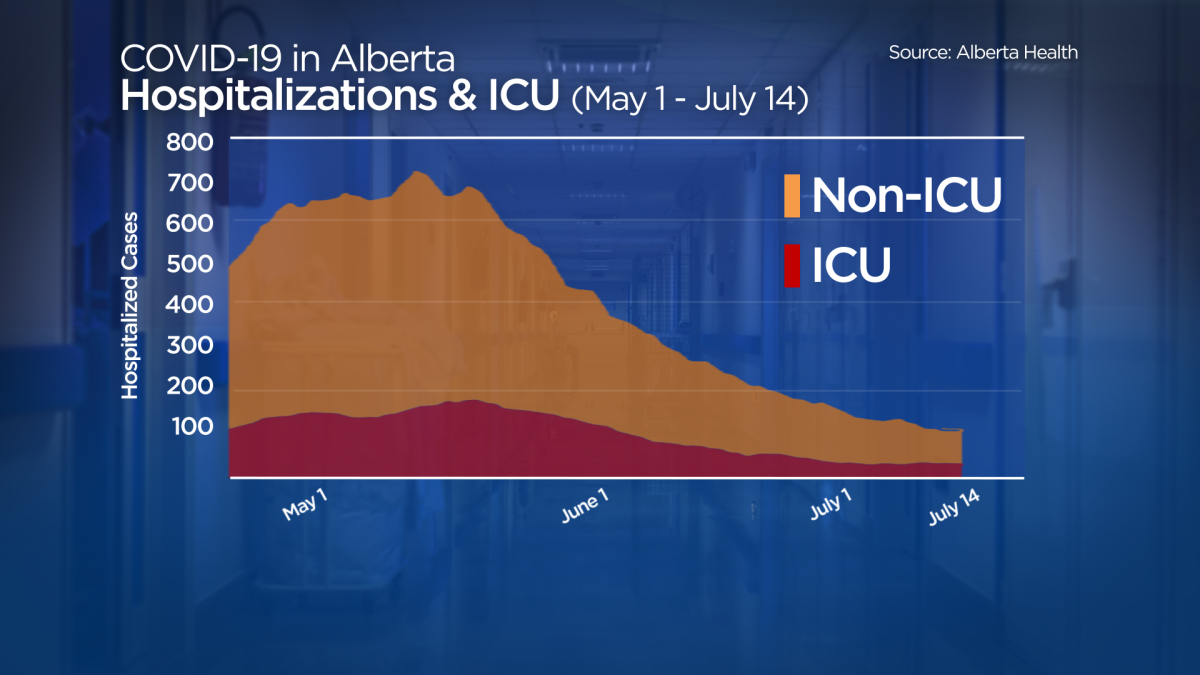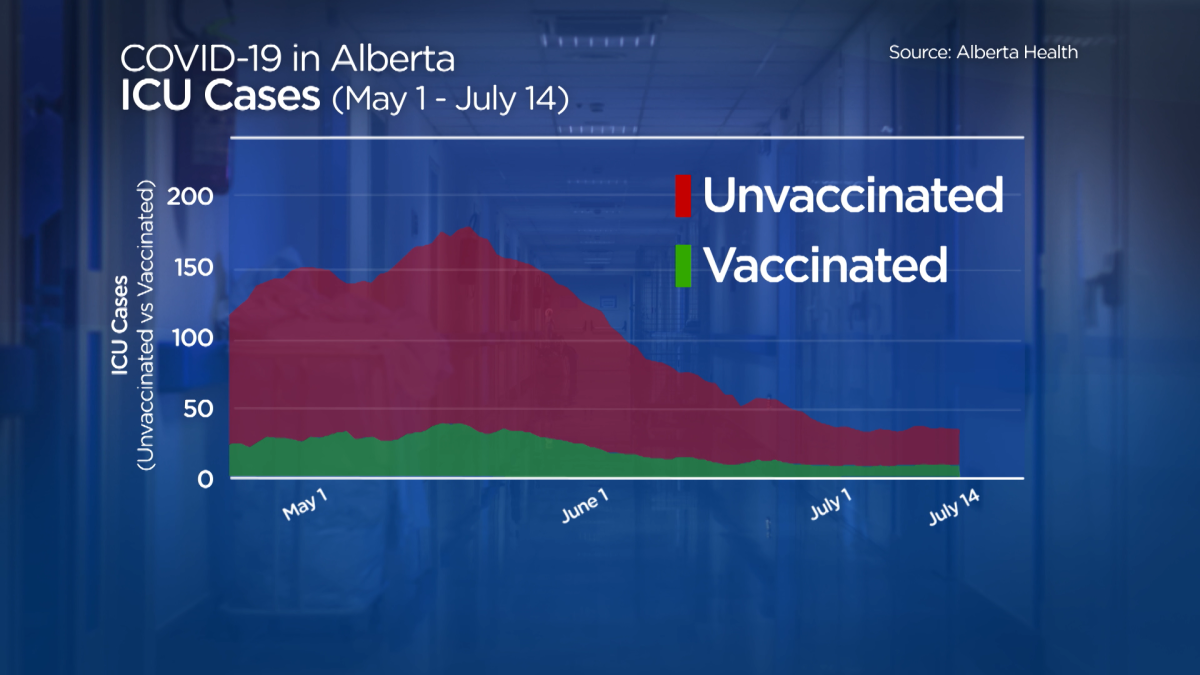It has been two weeks since Alberta fully reopened its economy, and while doctors say they are encouraged by the low number of COVID-19 cases, it is too early to make any conclusions.

On July 1, the province removed nearly all COVID-19 public health measures, though it kept mandatory masks in place in acute care facilities, continuing care facilities and on public transit, taxis and rideshares.
Case numbers have fallen dramatically since early May when strict measures were put in place to curb spread, and have typically been in the double digits since the start of July.
“It’s incredibly encouraging… I think the big difference here is our numbers are low and we are getting a significant proportion of the population vaccinated,” said Dr. Stephanie Smith, an infectious disease physician at the University of Alberta Hospital. “I think that gives us a lot more hope the numbers will continue to be low.”
Hospitalization and ICU admissions have also plummeted the last few weeks, though cases in ICU remain stubbornly stable.
“I’m not entirely surprised that we’ve seen a plateau in those numbers,” Smith said. “There are still a small number of people that are getting severe disease because they’re not vaccinated, and those people… are still getting very ill and having to go to ICU and having prolonged stays in ICU.”
Dr. Tehseen Ladha, a pediatrician with a master’s degree in public health, said that she is happy to see low case numbers but it is too early to tell what the full impact of reopening has been.

Get weekly health news
“In the past, we’ve looked at the two-week mark as the indicator of whether cases are going to go up or down, but we’re in a unique situation now because there are people who are fully vaccinated, and that could impact the timeline at which we start to see things go up again,” she said.
As of July 14, 74.4 per cent of the eligible population had received one dose of vaccine while 57.1 per cent have been fully vaccinated.
READ MORE: Geographical differences in vaccination coverage prompt call from Alberta doctors to boost uptake
But vaccination rates vary across the province, with some regions of northern, eastern and southern Alberta seeing less than 50 per cent of their eligible population immunized. No vaccine has been approved for children under the age of 12.
“When we look at who is hospitalized in the U.S., it is the unvaccinated… That’s where we are seeing the creep up in cases – in places where there’s very low vaccination rates,” Smith said.
Dr. Parker Vandermeer is a rural physician and said the topic of vaccinations is still pretty divided outside of urban centres.
“I would say in my experience, the older population is much more interested in the vaccine,” he said. “Some other ones, it’s a little bit more begrudgingly because they acknowledge, you know, if I want to travel, I’ll need to get it so I might as well get it done with.
“There’s still more questions in the younger community. I had a couple patients make the comment, ‘Well it hasn’t affected me. I haven’t seen people with it.’ So there’s still that hesitancy to get something they maybe don’t understand.”
Vandermeer said the pockets of Alberta with low vaccination rates could be the hardest hit by the Delta variant, which is 60 per cent more transmissible than the Alpha variant of the virus.
READ MORE: Delta COVID-19 variant: A look at the risks, symptoms and impact on vaccines
“They’re not going to have any of that immunity from the vaccines. Their cases might be just as severe as… before. Obviously nothing has really changed. They’re not vaccinated,” he said.
His biggest concern now is capacity, saying that if there is a spike in cases, it may be difficult for the system to cope.
“Rural does not have the capacity that massive hospitals have. So if we do start to get big spikes, it’s going to mean a lot of transfers to the city. It’s going to be a lot more load on the city,” Vandermeer said.
The reproductive value, or R value, of the virus in Alberta had been dropping, but it is starting to inch up. The R value explains how many people one positive case will go on to infect – a number higher than one means the virus is spreading while a number lower than one means it is not spreading as much.
READ MORE: What the coronavirus reproduction number is, and why we should keep an eye on it
The week of June 21 to 27, the province had an R value of 0.75. The Edmonton zone stood at 0.73, the Calgary zone stood at 0.74 and the rest of Alberta was at 0.77. The week of July 5 to 11, the province had an R value of 0.84 while the Edmonton zone stood at 0.97, the Calgary zone was at 0.88 and the rest of Alberta was at 0.69.
“I think it’s multi-factorial,” Ladha said about why the R value is increasing
“I think it definitely is likely partly due to the Delta variant… All the public health restrictions have an impact on the R value. Since we have lifted those, we will see the R likely continue to increase… I think, really, next month in August we will be able to tell which way this is going to go.”
The doctors said Alberta may be reopened and seeing lower case counts, but they are asking people to proceed with caution.
“We do still have some COVID(-19) circulating and the vaccine is like SPF50. If you get enough exposure to the sun, you are going to get burned,” Smith said.
“You just have to think about when you are in communities and think about what activities you’re going to do and what layers of protection you might want to take.”














Comments
Want to discuss? Please read our Commenting Policy first.